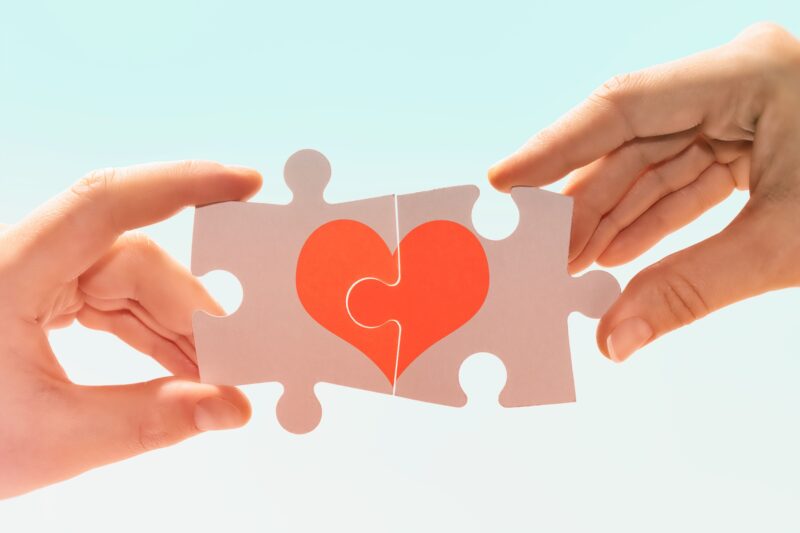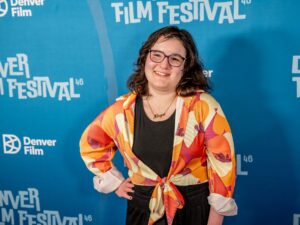Matched by Ali is a bespoke matchmaking service. With Valentine’s Day on the horizon, we wanted to shine a light on a business built to bring love to people. The business partners, Alissa Sherman and Alison Adler (together Ali and Ali) are also a match made in heaven. They met when they both had similarly bad experiences with their kids at junior kindergarten. Their boys ended up becoming friends and the two bonded over the shared trauma over both their bad experiences at the schools and having children in school at the height of the H1N1 epidemic.
Alison stated, “Alissa is a very beautiful girl, and she’s also very well spoken, but compared to who she is on the inside and her depth of character, her loyalty and her commitment as a friend – very few people get to experience that the way I have. It was like a match making thing. I am very closed off. She had to push past all of my boundaries, just like she does with our clients to get to the core of who I was.”
Alissa continues, “The feeling is mutual. Alison does not give herself enough credit. She is all of those things too and more.”
Matched by Ali is tailored to the client’s unique desires and values. We recently had a chance to speak with the two Alis and learn more about what makes Matched by Ali so special and different in a world where algorithms tend to dictate matches:
What inspired you to start Matched by Ali, and what is your background in matchmaking?
Alissa: Matched by Ali started as a passion project, born from two things: my love for connecting people and my frustration with how transactional modern dating has become. I’ve always believed that love is the most important investment we make in life, so I wanted to create a service that felt personal, intentional, and transformational—rather than transactional, as so much of modern dating appears to be.
Before Matched by Ali, I was the head of Global Sales for a healthcare company, where I was the top performer worldwide for many years. My success wasn’t just about numbers—it was about understanding people deeply. I learned how to listen, build trust, and uncover what people truly wanted. I could read between the lines, and that skill, combined with my background as a relationship coach, naturally led me to matchmaking.
What truly inspired me was seeing how many incredible people were being overlooked on dating apps. I felt there had to be a better way. Ali (Alison) and I had been friends for a long time, and during one conversation we both agreed that the current state of dating was dismal. We wanted a way to connect people in a much more meaningful, traditional way. That’s how Matched by Ali was born. We don’t just match people—we transform the way they see relationships.
Do you also create relationships that are non-romantic for your clients or is it strictly more, about romantic relationships?
Alissa: They come to us specifically for romantic relationships, but when we work with them, they learn so much about themselves and what true connection means. They apply that to every relationship in their life, whether it is with their family, friends or colleagues. They become better versions of themselves, and by extension, they are able to attract the person that they want to spend the rest of their life with.
Is your interest in matchmaking related to being a relationship coach?
Alissa: My success in sales has enabled me to become an attentive listener who truly understands people’s needs. I believe my background in coaching allows me to delve deeper than most in this role. I know how to help individuals put their best foot forward by guiding them through the process, fostering self-awareness, and exploring their shadows to uncover unmet or unrealized potential. In sales, I didn’t have to facilitate as much personal transformation with my clients, but I was still addressing the same needs and concerns.
I also worked as a server when I was a teenager—a role that taught me a great deal about connecting with people. Although many consider serving a trivial job, it exposed me to a high-stress, fast-paced environment and taught me to understand what every person truly needs.
How do you determine compatibility between clients?
Alissa: I believe it’s a blend of science and art in understanding human connection. At Matched by Ali, we don’t just consider the typical factors that a dating app might—such as shared interests or backgrounds. We dig deeper with our clients. We want to understand their values, emotional availability, communication styles, and even energy dynamics. That’s why we take our clients out for dinner and make it a priority to meet them in person whenever possible.
Sometimes, we meet people who, on the surface, seem very different but share a resilience born from overcoming challenging relationships or hardships in their family or background. They are very aligned and likely would have never swiped right on a dating app. We can sense those kinds of mutual interests and intangibles.
Where does science come in, versus the algorithm?
Alissa: People think there’s a formula—right age, religious background, cultural background, height, physical attraction. That’s the science of matchmaking. You want all those factors to line up, but we take it a step further. We delve into aspects that are much more meaningful, such as value systems, resilience, energy, and emotional awareness. These qualities are intangible and can’t be quantified on a form or in a telephone interview; they require getting to know someone on a much deeper level.
Ultimately, it’s the ability to see beyond the surface that sets us apart. Every match we curate is influenced by both connection and strategy. Although strategy plays a role, Alison and I bring an intuition honed by years of formal and informal experience. The combination of these elements elevates our approach to an entirely different level.
Alison: Sometimes, people come to us with a clear idea of what they want. However, part of our role is helping them recognize what they truly need—something we uncover through the in-depth conversations we’ve already had with them. By the time they seek our help, they’ve often been dating for a while but haven’t found success, usually because they’ve been choosing partners who aren’t the right fit for them.
Can you describe your matchmaking process from the initial consultation to the first date?
Alissa: The initial consultation, which we call the “deep dive,” is our opportunity to truly get to know the person behind the profile. If the client is in the same city as us, we meet with them in person and ask thoughtful, in-depth questions about their life, dreams, and the lessons they’ve learned from past relationships. This is not a rushed meeting—it serves as the foundation for the entire journey we’ll embark on together.
If an in-person meeting isn’t possible due to location, we conduct the deep dive via Zoom, but we still strive to make it as personal as possible. Sometimes, we’ll grab a drink and create a relaxed, mock-date atmosphere—even if it’s virtual—to get to know the person on a deeper level.
Once we complete the deep dive, Alison and I review our notes and begin what we call “the pipeline” process. We carefully evaluate potential matches, searching through our own database, networking, and collaborating with other matchmakers within our extensive network.
From there, we brainstorm together and prioritize potential matches in order of compatibility. We then begin introducing matches to our clients, tailoring the process to their preferences. Some clients choose to put full trust in us, recognizing that their own past choices haven’t led to success, while others prefer to be more involved, requesting detailed information about their potential match. For those who want to be more involved, we provide profiles, photos, and a comprehensive background.
Ultimately, we let the client take the lead, ensuring they feel comfortable and in control—because at the end of the day, this is their journey.
What criteria do you use to select potential matches for your clients? How do you incorporate client feedback into your process
Alissa: We are always looking for alignment in the areas that matter most—values, life goals, emotional readiness, and communication styles. We don’t focus on superficial factors that many people initially think are important, such as height, eye colour, or the number of children they want. Instead, we prioritize intangible qualities that can’t be easily quantified, like the energy someone brings into a room or how they make others feel when Alison and I interview them. Ultimately, our goal is to consider all these meaningful aspects so that when we introduce matches, they bring out the best in each other.
Client feedback is critical to our process. After every introduction, we have deep, honest conversations with both parties. This feedback provides valuable insight, helping clients better prepare for future connections or recognize areas for personal growth. Often, people believe they are projecting a certain energy or impression, but it may be received very differently. Constructive feedback helps them understand how they are perceived by the world, and that disconnect may be the very reason they haven’t found success in the past.
Do you provide this feedback, whether the date is successful or not?
Alissa: Always. It’s imperative, and it’s what makes our process so unique. We take the time to provide every single person with feedback. At the end of the day, it’s not just about finding a romantic partner—it’s also about helping them become the best version of themselves.
Even if someone has an amazing first date and is set to go on a second, we still offer feedback on small things that can boost their confidence. Maybe they came across as nervous or fidgety, talked too much or too little—while it’s just one person’s perspective, it can still be valuable insight.
We are always sensitive of how we deliver feedback, ensuring it never comes across as criticism. We only share feedback if we believe it will genuinely help someone grow. If the criticism isn’t constructive or necessary, we simply don’t share it.
At what point you step aside and no longer provide feedback?
Alison: When they die. Just kidding!
Alissa: She’s not kidding. I’m still communicating with our couples that are in relationships. I am invested in their success, and their happy ending. While we are not giving feedback anymore, we are asking for feedback, input, and we want updates. We develop friendships with our clients and want an invitation to the wedding.
Alison: Sometimes they’re going through something with the relationship, and Alissa has spent a lot of time helping them out in the beginning. If they hit a wall, and they’re not sure what to do, they’ll often reach out and say, let her know what’s happening and ask where to go from there. If we speak to both sides, we can figure out what is blocking the progress. Sometimes it’s just a matter of miscommunication.
Tell us about a success story that really moved you.
Alissa: Haley came to us after a terrible divorce. She thought she was unlovable. She was nervous, anxious, and felt like this was her last attempt—if this didn’t work out, she wasn’t going to date anymore. With two young kids, she believed no one would want her. Alison and I looked at each other and thought, This is going to be a challenge.
For her first match, we paired her with a man who also had two young kids. When I called him for his interview, I said, You have to meet this woman—because I just knew they would connect. I had learned enough about her to understand what would work for her. But he was hesitant. He told me, Absolutely not, Alissa. I’ve had a hundred first dates. I’ve given up.
I asked him to trust me.
They went out on a date, and that night, he called me and said, The worst part of that date was having to tell her that you were right—I would have regretted it if I hadn’t gone.
She later wrote to me, saying she couldn’t have imagined a better human being, even if she tried to make one up.
To this day, they are still together and have beautifully blended their families. They’ve been inseparable since. And the most beautiful part? Both of them were so reluctant—but by fully trusting us and taking that little push, everything worked out.
A small business has successes and failures. What did you learn from your failures and how did it make Matched By Ali Better?
Alissa: In the early days of our business, we tried to take on too many clients, thinking that scaling quickly meant we could help more people. What we learned over time is that matchmaking isn’t about volume. We could have taken on more clients, but we are much more selective now because, for us, it’s about the depth and quality of customer care and service we can provide.
Many in the industry rely on the “spaghetti analogy” — you throw enough spaghetti, and something will stick. In contrast, we focus on quality over quantity. We have become highly selective about who we work with to ensure we have enough time to give each client the attention they deserve. It’s important to us to fulfill all our promises. We even turned away people we didn’t think we could help. In the past, we were overly ambitious and happy to take on anyone, but we now realize that taking on too many people just doesn’t make sense.
Finally, what is next for Matched By Ali?
Alissa: Our focus is on elevating the matchmaking experience while expanding globally. Our goal is to achieve global recognition—potentially by entering markets in Europe and Israel. Currently, we’re available in North America, and we plan to keep growing our network of singles across the region while maintaining the personal touch that makes us unique.
We don’t want to be like other matchmaking agencies that become so large that clients never get to speak with their matchmaker, reducing the experience to numbers or an algorithm. We always strive to offer a unique, white-glove, curated service—finding that balance between exponential growth and a highly personalized experience.
To learn more and sign up for the free database, visit MatchedbyAli.com.








